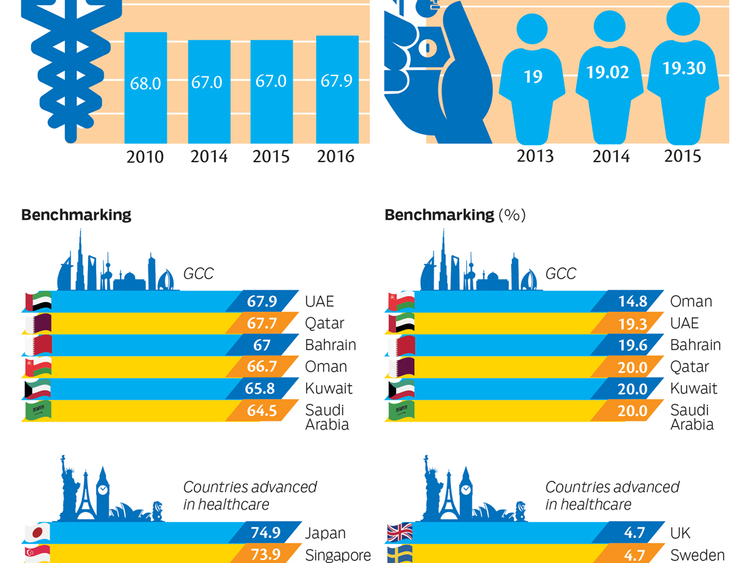Dubai: The UAE enjoys the lowest exposure to health problems globally, according to the results of health indicators announced by the UAE government on Tuesday.
The health indicators predicate the National Agenda goals and the UAE’s vision 2021 and aim to accredit all private and public hospital in accordance with national and international standards.
The UAE has seen significant improvement in terms of the Health Care Quality Indicator during 2016, jumping from the 34th position in 2015 to 28th in 2016. according to the Legatum Prosperity Index report, which is usually issued annually by the Legatum Institute.
The Health Care Quality Indicator measures states’ rankings based on the level of health care quality in three areas — primary health care outcomes, infrastructure and preventive health care and satisfaction with physical and mental health care.
When UAE residents were asked about health problems and whether they suffer from any health problems that hold them back from following their daily routine, the vast majority of the sample replied in the negative, enabling the UAE to rank first globally in the Health Care Quality Indicator.
The UAE also ranked 9th globally in the sub-index level of ‘satisfaction with health care’, placing the country among the global top 10 countries in terms of residents’ satisfaction with the health services.
Meanwhile, the UAE has seen a significant surge in private and public hospitals meeting the accreditation criteria, with 55 per cent of hospitals meeting the criteria in 2015 compared with 46.8 per cent in 2014. This index, which was tailored specifically to the UAE, measures the percentage of private and public hospitals meeting the national and international accreditation criteria.
According to International Diabetes Federation report, which covers 220 countries in the world and measures the number of people with diabetes to the overall population aged from 20 to 79, the percentage of people with diabetes in the UAE has posted at 19.3 per cent, making it the second least statistically in the Gulf region after Oman, which recorded 14.8 per cent.
In addition, the UAE has surpassed the entire Arab region in terms of the life expectancy indicator. Based on the World Health Organisation (WHO) report, which is issued every year and measures the life expectancy percentage in 194 countries, the life expectancy percentage in the UAE increased from 67 in 2015 to 67.9 in 2016, exceeding all Arab countries.
The National Agenda which was launched as per the directives of His Highness Shaikh Mohammad Bin Rashid Al Maktoum, Vice-President and Prime Minister of the UAE and Ruler of Dubai, involved several health indicators that contribute to the creation of a health system based on international criteria and focuses on bringing down the death rates due to cardiovascular diseases and cancer.
The 2021 Vision national agendas aim to raise the awareness among the public to adopt a healthy lifestyle at an early age and to reduce childhood obesity.
The agenda also focused on reducing smoking rates among both genders. According to the WHO estimates, the percentage of male smokers in the UAE recorded 19 per cent while female accounted for 2 per cent.
Health infrastructure and resources are one of the most important areas in the national agenda to achieve a world-class heath system. One of the UAE’s achievements has been that it managed to offer an average of 2.53 physicians per 1,000 people and 3.16 nurses per 1,000 people according to WHO estimates in 2015.











